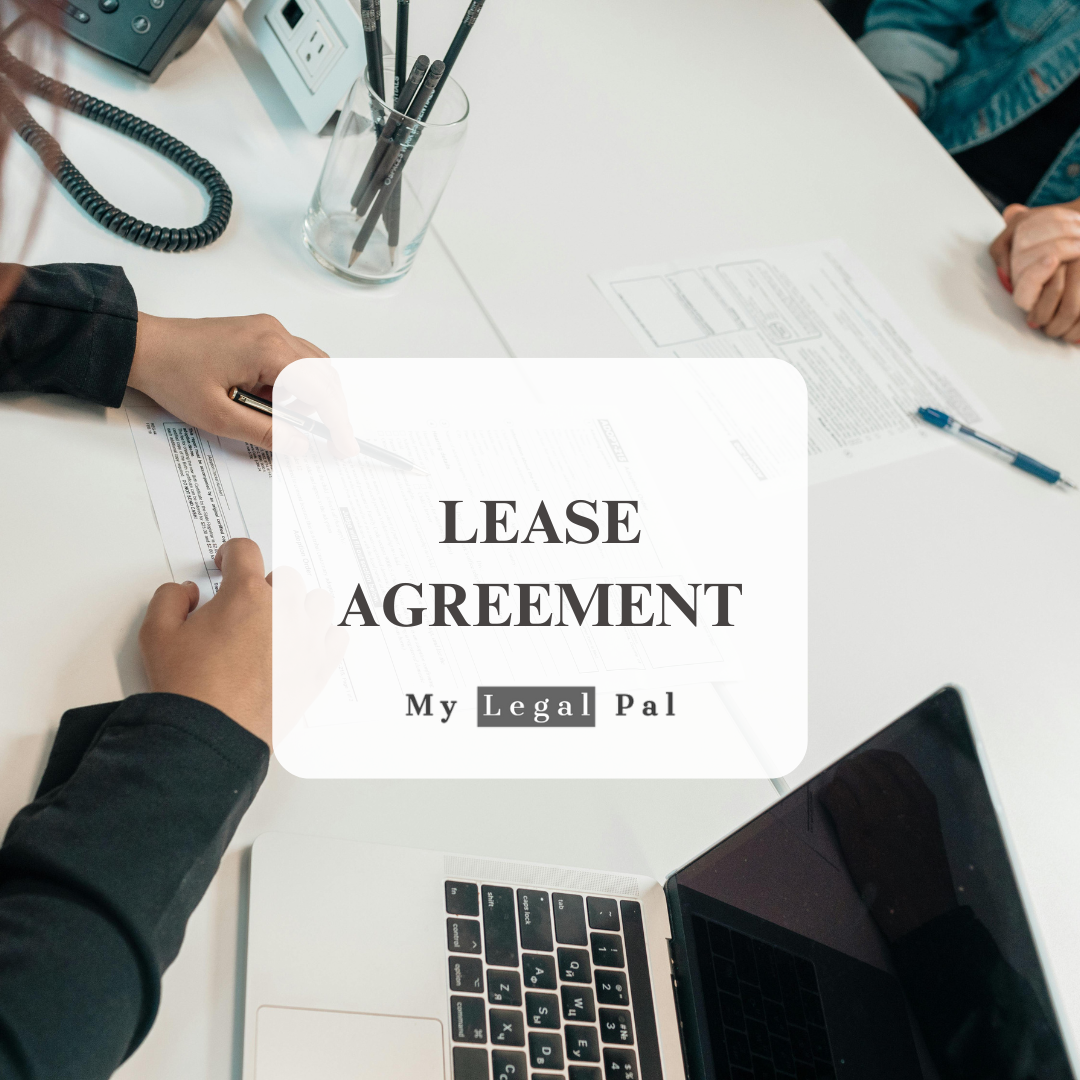Draft Lease Agreement by Expert Attorney
At My Legal Pal, we understand the critical role a well-drafted lease agreement plays in protecting your rights and interests as either a landlord or a tenant. A lease agreement isn’t just a formality; it’s a legally binding contract that outlines the terms and conditions of a property rental. Poorly drafted agreements can lead to legal disputes, misunderstandings, and significant financial losses. That’s why our lease agreement drafting services focus on precision, clarity, and customization, ensuring that each document we produce is not only legally sound but also meets your specific needs.
Whether you’re renting out a commercial space, leasing a residential property, or securing a rental for any other purpose, My Legal Pal offers comprehensive lease agreement services that give you peace of mind. We ensure that every essential aspect of the lease is covered, from rent terms to dispute resolution, compliance with local laws, and more. In this blog, we’ll explore our approach to lease agreement drafting, why it’s important to have a well-structured lease, and how our services stand out from the rest.
What is a Lease Agreement?
A lease agreement is a legal contract between a landlord (the owner of the property) and a tenant (the individual or business renting the property). This document outlines the terms and conditions under which the tenant may occupy the property. It typically includes information on the duration of the lease, the amount of rent, the rights and responsibilities of both parties, and any specific terms that apply to the rental arrangement.
Lease agreements can be used for both residential and commercial properties. A residential lease might be for an apartment, house, or condo, while a commercial lease could apply to office space, retail locations, or industrial properties. Each type of lease comes with its own set of legal requirements and considerations, making it essential to tailor the agreement to the specific situation.
Key Elements of a Lease Agreement
At MyLegalPal, we ensure that every lease agreement we draft includes all necessary elements to protect your interests and avoid future disputes. Key components include:
- Parties to the Lease: The lease must clearly identify the landlord and the tenant, including their legal names and addresses.
- Description of the Property: The lease must include a detailed description of the property being rented, including its address and any specific details about the unit or space being leased (e.g., apartment number, square footage).
- Lease Term: This section outlines the duration of the lease, whether it’s a fixed-term lease (e.g., one year) or a month-to-month agreement. It should also include the start and end dates of the lease.
- Rent Details: This is one of the most important aspects of the lease agreement. It should specify the amount of rent, when it is due, and how it should be paid. Additionally, this section might include information about late fees, security deposits, and other charges (e.g., utilities).
- Security Deposit: A security deposit is often required by the landlord as protection against damage to the property or non-payment of rent. The lease agreement should specify the amount of the security deposit, the conditions for its return, and how it can be used.
- Maintenance and Repairs: This section details the responsibilities of both the landlord and the tenant regarding the upkeep of the property. It should clearly define who is responsible for making repairs and maintaining the property’s condition.
- Use of the Property: The lease should outline how the property can be used. For example, in residential leases, this might restrict the property to residential use only. In commercial leases, this section could specify the type of business activities permitted.
- Pet Policy: If applicable, the lease should address whether pets are allowed on the property, and if so, what types, sizes, and any associated fees or deposits.
- Termination and Renewal: This part of the agreement should cover how the lease can be terminated by either party, whether it can be renewed, and what notice must be given.
- Dispute Resolution: A clear procedure for resolving disputes between the landlord and the tenant should be outlined in the lease. This might include mediation, arbitration, or litigation processes.
- Compliance with Local Laws: The lease agreement must comply with all relevant local, state, and federal laws, including regulations regarding rent control, tenant rights, and landlord responsibilities.
- Special Clauses: Depending on the nature of the property or the specifics of the arrangement, special clauses might be added to the lease. These can include provisions regarding subleasing, alterations to the property, or rules for common areas (in multi-unit buildings).
The Importance of a Well-Drafted Lease Agreement
A lease agreement is more than just a formality; it’s a legally binding contract that sets the foundation for the landlord-tenant relationship. The terms and conditions set forth in the lease will dictate how the rental arrangement operates and how disputes are resolved. Without a well-drafted lease, both parties are vulnerable to misunderstandings, disputes, and legal complications.
Protecting the Rights of Both Parties
A properly drafted lease agreement protects the rights of both the landlord and the tenant. For the landlord, the lease ensures that the tenant adheres to the agreed-upon terms, such as paying rent on time, maintaining the property, and respecting any restrictions outlined in the contract (e.g., no subletting or unauthorized modifications). For tenants, a well-constructed lease protects them from arbitrary actions by the landlord, such as unjust eviction, sudden rent increases, or violations of their right to quiet enjoyment of the property.
Minimizing Legal Disputes
A vague or poorly drafted lease can lead to misunderstandings that escalate into legal disputes. When both parties clearly understand their rights and responsibilities, the likelihood of disputes is greatly reduced. At MyLegalPal, we take great care to ensure that every lease agreement is clear, unambiguous, and thorough, helping to minimize the risk of future conflicts.
Ensuring Compliance with Laws
Every jurisdiction has its own set of laws and regulations governing lease agreements. For example, many cities have rent control laws that limit how much a landlord can increase the rent, while others have strict rules regarding security deposits and tenant rights. At MyLegalPal, our legal experts are well-versed in local, state, and federal laws, ensuring that your lease agreement complies with all relevant regulations. This helps protect both landlords and tenants from legal violations that could lead to costly penalties or lawsuits.
Customization for Specific Needs
Every property and rental situation is unique, which is why a one-size-fits-all lease agreement simply won’t suffice. At MyLegalPal, we tailor each lease agreement to the specific needs of our clients. Whether you’re renting a commercial space to a retail business or leasing a residential apartment, we make sure the terms are customized to fit the situation. This personalized approach ensures that every lease is relevant, enforceable, and aligned with your goals.
Types of Lease Agreements We Draft
MyLegalPal offers a range of lease agreement drafting services to meet the needs of both residential and commercial landlords and tenants. Our expertise covers a variety of lease types, including:
1. Residential Lease Agreements
Residential lease agreements are used when renting out properties like apartments, houses, or condos to tenants. These agreements are subject to specific laws that protect tenant rights, such as rules governing evictions, rent control, and habitability standards. At MyLegalPal, we draft residential leases that protect landlords while ensuring compliance with all applicable laws and regulations. We also address specific landlord-tenant issues, such as maintenance responsibilities, rent increases, and pet policies.
2. Commercial Lease Agreements
Commercial lease agreements govern the rental of spaces used for business purposes, such as offices, retail stores, warehouses, and industrial properties. These leases are often more complex than residential leases because they involve additional factors, such as the use of the property for business operations, liability concerns, and zoning restrictions. Our legal team has extensive experience drafting commercial leases that address these complexities while protecting the interests of both parties.
3. Short-Term Lease Agreements
Short-term leases, such as month-to-month rental agreements, require flexibility while still protecting the rights of both parties. These agreements are common in situations where a tenant is not ready to commit to a long-term lease or where the property owner prefers short-term rentals. We ensure that these agreements are flexible yet legally binding, with clear terms regarding rent, notice periods, and tenant responsibilities.
4. Sublease Agreements
Sublease agreements occur when a tenant rents out all or part of their rented property to another tenant. These arrangements can be complex, as they require the permission of the landlord and a clear delineation of responsibilities between the original tenant and the subtenant. At MyLegalPal, we help tenants and landlords draft sublease agreements that protect all parties involved and comply with the original lease terms.
5. Lease Renewal Agreements
When a lease term is coming to an end, both parties may wish to renew the agreement under the same or modified terms. Our lease renewal agreements make it easy to extend a rental arrangement without starting from scratch. We can adjust key terms, such as rent, lease duration, or other conditions, while ensuring the agreement is legally binding and enforceable.
Why Choose MyLegalPal for Lease Agreement Drafting?
Choosing the right legal partner for drafting lease agreements is critical to ensuring that your property rental transactions are smooth, secure, and legally sound. Here’s why My Legal Pal is the right choice for your lease agreement needs:
Our team of legal professionals has extensive experience drafting lease agreements across various sectors, including residential and commercial real estate.
Reviews
There are no reviews yet.





Be the first to review “Draft Lease Agreement”